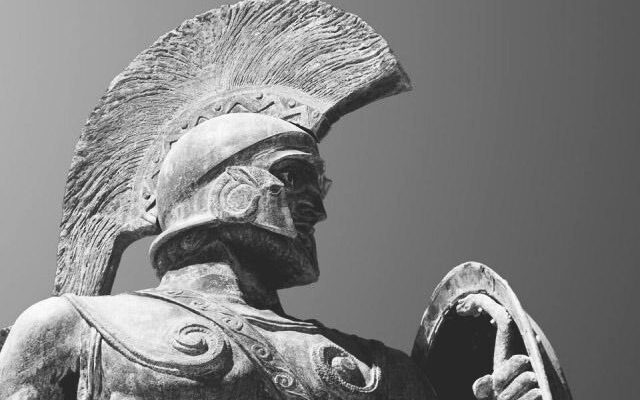John Randolph of Roanoke (1773-1833) said that he had never seen, “A Yankee who knew anything about the classics.” Exaggerated or not, Northerners readily recognized that antebellum Southerners loved to display their knowledge of Greek and Latin and had more than passing familiarity with the untranslated classics.
From the beginning, the South felt a spiritual kinship with the Greco-Roman civilization and parallels with Sparta in particular because of the city-state’s all-encompassing martial spirit, commitment to duty, and rule by a small citizen class of aristocracy and landed gentry. There was also an unflinching acknowledgement that both required the helot/slave class to sustain their agrarian economies. The Southern interest in Sparta goes deeper, however.
Sparta’s 1,000-year history was deeply explored by the Southern aristocracy because it offered a tantalizing example that suggested a potential for enduring greatness that was achievable if the right lessons were learned from Sparta’s rise and fall. And one of the keys to Sparta’s success was that it represented the rarest of balances a long-lasting civilization could attain: a perpetual warrior ethos that intentionally nurtured a high culture that was to serve it.
Unlike Athenian high culture, Sparta’s architecture, art, music, and literature, was employed to preserve the military spirit that kept decadence at bay. Spartan art and music was paid for by the city-state itself and was mostly a celebration of Sparta. Public monuments glorified figures of the state in what today many would label as unbridled patriotism and state-sponsored propaganda. But the Spartans didn’t view it that way at all. They believed Sparta was great and what they’d built over centuries deserved to be celebrated, glorified, and worth giving one’s life for.
While antiquity significantly inspired the Anglo-Saxon Tidewater aristocracy and landed gentry, the military tradition of the Deep South and Appalachian populations didn’t look to Sparta. Upon arrival, they were already genetically fortified by their Scot-Irish and Welsh heritages and a predisposition for autonomy and a fierce willingness to fight for it.
Given this backdrop, it is no surprise that throughout the South, men of all classes regularly follow the family tradition of military duty. From the Tidewater to the backwaters, a complex mixture of intellectual, historical, mythical, heritage, and ancestry created a warrior ethos that had no equal in any other region in the United States.
An honest assessment of the South today, however, suggests that the warrior spirit is in grave danger.
The High Culture Paradox
A high culture can only emerge once significant free time is possible. By high culture, I mean something of especially good quality, enduring merit, and things that represent, in some sense, the very best and most meaningful things of the culture itself. High culture deeply explores aesthetics, beauty, abstractions, and philosophical things; in other words, the transcendent, what is good, true, and beautiful.
High culture requires the literal luxury of time that only success and comfort can provide. It then requires a commitment of those who can afford it, to cultivate those rare talents among the population who have the ability to create high cultured things – sophisticated music, stories, and art of all kinds.
The glories of an affluent civilization that can produce high culture however comes with the price tag of decadence. And decadence unchecked will inevitably devolve into an indulgent sensuousness that expresses itself in the arts and that will sap the vitality of the warrior ethos in a population.
Popular low culture ascends quickly. It appeals to base instincts and emotions and easily triumphs to leave the things that plumb the depths of the human experience and the soul’s journey abandoned and mocked.
The wise Spartans were well aware of the connection between the arts and the health of the martial spirit. More importantly, that even in peace, they knew that their warrior ethos was integral for their survival and must be protected.
Emulating the extreme low culture of the ghetto and the underclass is what terminal decadence looks like. A dead martial spirit is one that joins in the celebration of the damned in all its swishing pride.
A reborn South will necessarily be one that will also revive the controlled demeanor of the Spartan warrior. This will only be possible if it begins to think seriously about how it will tame the arts.

‘Cause down in Alabama, you can run, but you sure can’t hide.






Great article, the South still has a warrior spirit, but the gay federal empire pretty well squashes it in most kids. I’m a millennial and when I was a boy most of my friends wanted to join the Army or the Marines when they ‘grew up’. Young boys across the South even today have that martial instinct. The only way to preserve that is to get rid of the occupying sodomite federation.
Agreed. We need to channel and develop that spirit in our youth outside of the military. The same peer groups that connect to hunt, fish and hike need to think about what it wold look like to create a “cadet” experience even if informally. Acknowledging that impulse and shaping it with men in the community is a missed opportunity and frankly our responsibility.
Interesting. Personally, I’ve always looked at high culture as concerning
itself with permanence: earthly permanence in the form of continuation of
one’s family, nation, or race; divine permanence in the form of heaven or
hell. The best art incorporates both or balances them, while the most vile propaganda seeks
to turn one against the other: Recall Castro’s revolutionaries presenting
Cuba with the faux alternatives of foreign subjugation/influence or national
freedom gained by atheist revolutionaries whose personalities and state
institutions would then be worshiped; or how in the white West the
infiltrated churches are weaponized to force their congregations to choose
between salvation and continuation of their peoples and cultures–one of the
most heretical false dichotomies ever conceived.↵
By the way, Mr. Lamar, I
was wondering if you were still looking for the kind of all-encompassing
right-wing ideology you discussed in your essay series.
https://identitydixie.com/92021/04/15/part-3-are-you-one-of-us/
I ask because a little
while ago I sent an incomplete, draft version of a book I think would fit the bill to Dr.
Clyde Wilson to look at, and he seemed to find it interesting (he said to finish it–it’s about half done–and that Shotwell would, likely publish it). I was wondering
if you would like me to ask him to e-mail it, or what’s done so far, to you to take a look at.
I do believe we are inherently ideological creatures. And I do believe a coherent ideology for the Right is possible and will be needed to rally around (at least honestly debate) once the wheels come off the wagon. I would be sure to contact Shotwell first, publishers can be touchy about manuscripts floating around!
Oh, it wasn’t shown to them formally or anything, since it’s only halfway
done. Rather, I had sent it to Dr. Wilson to give me his opinion on–I would like to call him my mentor, but really, I’m not that familiar
with him; I only know him as the first-class academic who was humble enough and
generous enough with his time to review something that I’d written
previously, so I asked his opinion on this as well–and he, being one of
their founders, brought up the idea of having them publish it. It was just a
casual Would you be kind enough to give me your opinion on this? sort of
thing. So that you can read it if you wish, I’ve e-mailed Dr. Wilson and
asked if he could forward an e-mail to the ID editors who, being familiar
with him, will hopefully send it on to you. I hope you find it (assuming it reaches you) interesting.
Great article. Thank you Sir, it is what I have always thought about in regards to the Southland and Southerners in general, and what was lost, for now.
It reminded me of this quote during the fall of Rome.
“Ill starred wretch, who believes the spark Divine by squalor thrives”
Roman Aristocrat
There is a dignity that is being lost. Cartoonish versions of manhood and being a high speed operator vs. the maturity, restraint and peace that comes with recognizing you can be dangerous while enjoying the more cultivated and refined things in life.
Excellent! Good to see your word’s again.
This is very true, and it will most likely manifest through community sports clubs, archery clubs, and other combat adjacent
Activity.
Absolutely. Our side has been talking about parallel institutions for a long time. How about we first try organizing something simple like a two week long summer program for 13 year olds.